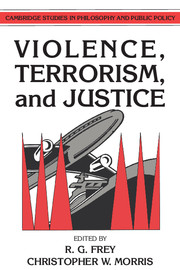Book contents
- Frontmatter
- Contents
- List of contributors
- Preface
- 1 Violence, terrorism, and justice
- 2 What purposes can “international terrorism” serve?
- 3 Violent demonstrations
- 4 Terrorism, rights, and political goals
- 5 The political significance of terrorism
- 6 Terrorism and morality
- 7 Which are the offers you can't refuse?
- 8 Making exceptions without abandoning the principle: or how a Kantian might think about terrorism
- 9 State and private; Red and White
- 10 State terrorism
- 11 Nuclear hostages
- 12 Rape as a terrorist institution
2 - What purposes can “international terrorism” serve?
Published online by Cambridge University Press: 05 June 2012
- Frontmatter
- Contents
- List of contributors
- Preface
- 1 Violence, terrorism, and justice
- 2 What purposes can “international terrorism” serve?
- 3 Violent demonstrations
- 4 Terrorism, rights, and political goals
- 5 The political significance of terrorism
- 6 Terrorism and morality
- 7 Which are the offers you can't refuse?
- 8 Making exceptions without abandoning the principle: or how a Kantian might think about terrorism
- 9 State and private; Red and White
- 10 State terrorism
- 11 Nuclear hostages
- 12 Rape as a terrorist institution
Summary
I confine my discussion to what is often called “international terrorism,” terrorism committed by nationals of one country, or by members of nationalist groups or organizations, against governments, institutions, or people in another country. I exclude the terrorism used by one or both sides in civil wars in Algeria, Vietnam, and Nicaragua. I exclude the terrorism exercised by despotic governments in Iran, Argentina, or South Africa, or the regimes of Stalin, Hitler, or Mao Tse Tung. I include most of the terrorism attributed to leftist movements, Arab nationalists, and groups like the Serbian separatists acting outside Yugoslavia. Some of what I shall say applies to terrorism directed against the terrorists' own government, but on a scale drastically short of attempted revolution.
What I have in mind is epitomized by the capture of Israeli athletes in Munich, the machine gunning of people at a TWA ticket counter, the hijacking of aircraft by leftist or nationalist groups, the kidnapping of an American general assigned to NATO. I exclude hijacking for fun, for profit, or for free transportation. I am thinking of terrorist acts that have at least ostensibly some political purpose.
I probably have in mind the kinds of terrorist activity that most viewers of television and readers of newspapers remember most vividly. The publicity this kind of terrorist activity receives is hugely disproportionate to the actual violence, compared with the outrages and occasional heroics committed by terrorist governments, occupying authorities, and insurgent or revolutionary movements.
- Type
- Chapter
- Information
- Violence, Terrorism, and Justice , pp. 18 - 32Publisher: Cambridge University PressPrint publication year: 1991
- 21
- Cited by

